I increasingly judge Souls-adjacent games not by the height of their bosses or the depth of their dungeons, but by the ingenuity of their shortcuts, and Flintlock: Siege Of Dawn has had my favourite shortcuts for some time. Rather than simply being routes to the other side of a barred door – though there are plenty of such Lordranian loops to be found in this game – they consist of aerial chains of magic, purple triangles that suck you towards them when you hold a button. They add vigour to a branching, faux-Napoleonic world that might otherwise be a collection of atmospheric strolls between bonfire equivalents and fights defined by tense resource systems. They’re bulletproof grappling hooks from which you can launch yourself to another triangle, a ledge filled with upgrade materials, or a musketeer hanging around in dire need of a ground strike.
Back to the shortcuts. First, a bit of setting the scene. In Flintlock, you play as Nor, a lean, dashing sapper from an army fighting the legions of the dead. As the curtain rises, Nor and his fellow field engineers accidentally break a portal that triggers a full-scale invasion of the gods of the underworld. The rest of the story is about closing the lid on Pandora’s box, with Nor galloping between towns, fast-travel shrines (which also respawn local zombies), and boss fights with escaped deities, all the while rallying his scattered friends to form a roving caravan of side-quest purveyors and power-up dispensers, who gather around campfires in your wake.
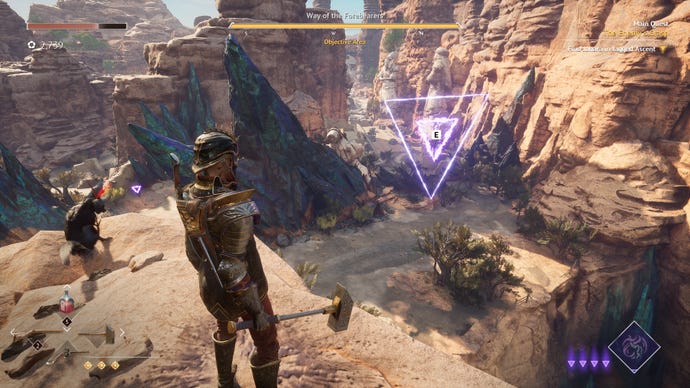
Early on, Nor also befriends one of the wandering gods, Enki, a feathered, fox-like wraith who accompanies you everywhere and is the source of your supernatural powers – most notably, Nor’s knack for lumbering around with bursts of enchanted black powder. Enki is God Of War’s Atreus, a support character with a face button, but with a few significant differences. First, he’s not burdened with any toxic filial angst, though he does have some baggage regarding the nature of his godhood. Second, he has a more limited repertoire of support skills than Atreus – basically, you can press a button to have him curse opponents, “setting them up” for a canned attack or an armour-splitting finisher, while also hoarding energy for a choice of mega AOE spells.
That focus makes it more forgettable than Atreus, but also less capricious. I feel the same way about much of Flintlock, which essentially combines God Of War with the Soulslike style of developer A44’s previous Ashen, then boils the mix down to a 20-hour “Soulslite” with a handful of party tricks of its own design. The result is a satisfying summer extravaganza that won’t take up too many weekends, with some questionable editing and the occasional genius beat.
The game’s inspirations are obvious from the title screen, but Flintlock wastes no time in expanding on them. Nor wields a one-handed melee weapon in his right hand and a pistol in his left. As in Bloodborne, the pistol is primarily used for defense—interrupting otherwise unblockable attacks and setting up the enemy for a counterattack. But the new pistols offer new uses. There’s a menacing radioactive tree root whose projectiles explode after a few seconds, hurling Prime into the target’s surroundings. There’s a blunderbuss that not only tickles enemies’ health bars, but also applies a wide-arc knockback, making it the perfect antidote to a roaming horde.
Melee weapons, meanwhile, are a wide variety: from hammers that can pierce through armor to incendiary axes that sometimes let you wait out the fight. Each of these reloads your pistol, with the game awarding a charge of gunpowder for every four hits that connect. So you’ll always be multiclassing, going after heads in order to gain the gunpowder to counter the next unblockable blow, though the game’s progression system—which can be canceled at will, regaining some of the associated XP, or “reputation”—lets you steer your approach toward sorcery, butchery, or gunslinging.
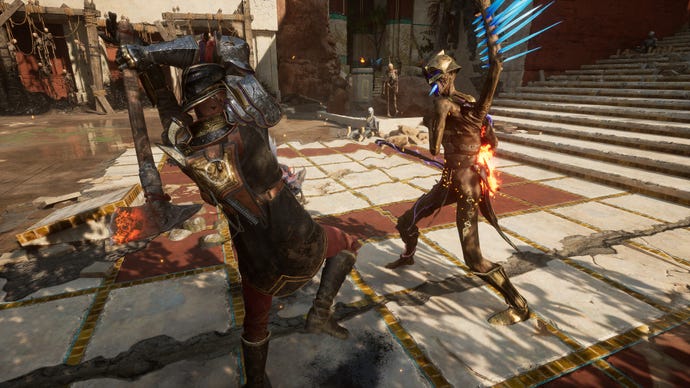
Adding to this finely-tuned combat alchemy are the effects of gear and gear synergies. Right now, I’m wearing a set of clothes that (if I recall correctly) makes me explode every time Enki applies four curses in a row, and also every time I gain gunpowder, and also every time I attack outside of a block. This makes regular skirmishes a little unscientific—sometimes I can’t see myself because of the dust. It’s also a handicap when traversing dungeons filled with gunpowder barrels and other volatile objects—the Flintlock environment designers are perhaps a little too fond of the latter. I also have the option of a crystal-encrusted outfit that turns my dodge into teleportation, and a golden gauntlet that duplicates my grenades as they fly.
There aren’t as many building options here as you’d find in a Soulslike or the latest God of War, but there’s plenty of room to tinker within the confines of a single playthrough. Flintlock isn’t as arduous as Souls or GOW on normal difficulty either – it doles out Estus-style health flasks to every village freed from the evil dead. But it does incentivise you to play well with a multiplier that hands out a reputation bonus per move the longer you go without taking damage. During combat, there’s the nagging question of when you should harvest your accumulated reputation, effectively negating the multiplier. Leave it running for too long and you risk losing thousands of XP to the next zombie who wants a hug.
In addition to pistols, Nor has longer-range weapons in the form of rifles, mortars, and a pistol that spits rolling shells. In my hands, these tools exist to take out snipers and nullify weird mid-bosses that I don’t feel like dueling. Rather than organic extensions of the combat system, they feel like a safety valve for the inevitable boredom of any game that consists primarily of melee combat. I don’t mind them being there, but they don’t feel necessary.
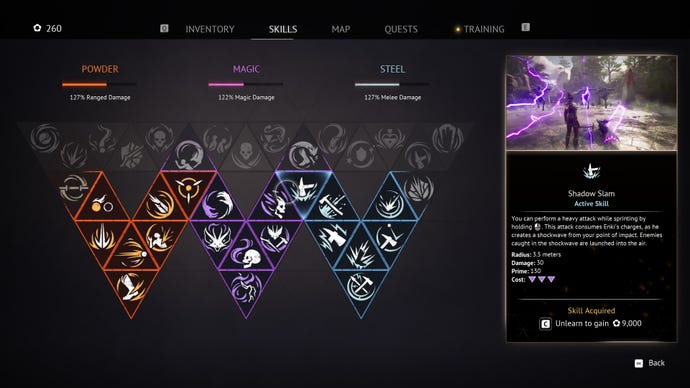
I feel similar feelings of disenchantment with the plot and writing, to the point that I’ve absentmindedly grafted them to some extent onto the ranged combat mechanics. Flintlock’s world is gorgeous, with its faux Turkish cafes run by creatures made of arms gripping masks, its eye for details like cracked murals and copper ladles contrasted with its love of bone-white palaces that swallow the horizon and celestial mineral tumors. The broader ambient themes include the rise of blind fanaticism driven by fear of mortality, and there are bits of written mythology to be discovered. But the people seem shallow. Nor’s companions are chatty and have loyalty quests attached to the fanciest kit, but for the most part they’re glorified upgrade menus. The other quest-giving NPCs are terse 8-bit RPG creatures, though the voice acting is snappy.
Some NPCs are players of Sebo, a mildly appetizing minigame that’s a kind of tic-tac-toe game played on a triangular board, using tokens that can have special abilities like jumping over enemy pieces. It’s a nice addition, one I’d like to revisit now that I’m out of the deadline, but the artificial abundance of Sebo players reflects an environment that’s not quite sure whether it’s a world or a procession of shifting distractions and shiny backdrops.
Nor is not a gruff do-gooder with a complicated past—a charismatic main character, to be sure, but without much emotional texture. She is at her best when discussing with Enki their radically different conceptions of the cosmos. For all his divine insight and mellifluous voice, Enki can be touching and childlike (as the other gods can be, less touchingly). There is a sweet anti-Quixote moment when he is captivated by the spectacle of a windmill. A little later, a visit to some memorials provides an opportunity to talk about loss and remembrance. What happens to deities when they perish?
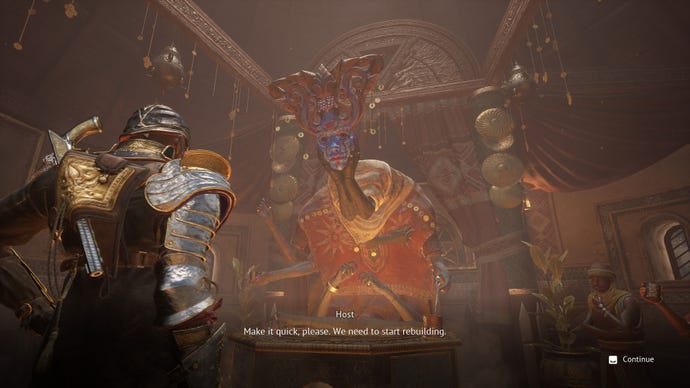
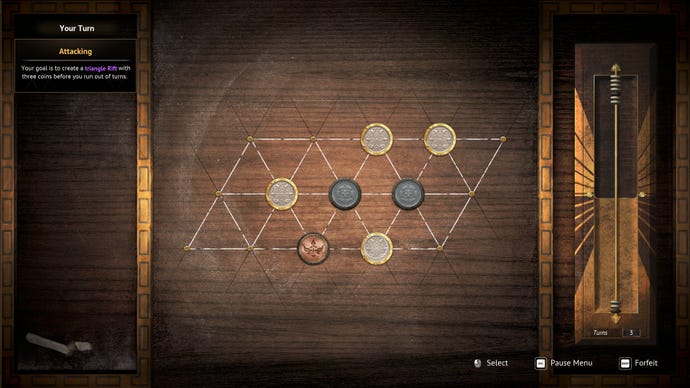
There’s always the danger that a seasoned genre hybrid will be reduced to the sum of its influences, but Flintlock: Siege Of Dawn manages to pull it all together and apply enough rotation to stand out. On that note, those shortcuts. Spinning and running between cosmic triangles is a pleasure in itself, especially when the game seductively stretches the space between certain grappling points, daring you to air-dash and double-jump to continue the chain. But the real payoff is the sensation of unearthing a designer’s hidden logic, because bringing those triangles out is also the slow realisation that every layout, no matter how dank and ghoul-clogged, no matter how Souls-adjacent, is designed to be savoured from above.
Each network of air launchers must be summoned, strand by strand. As you follow the quest paths, the controller’s rumble draws you toward opalescent skull pedestals that spit out the next set of triangles. By the time you’ve completed this quest, you should have a full-on roller coaster ride ready and waiting to whisk you back to the last town center or campfire. If you take one too many musket balls to the ribs while climbing, unlocking the triangles as you go also makes the familiar rite of regaining your lost XP less of a chore.
There’s a point in the second major region where you find yourself at the top of what is effectively a massive slide, a sheer drop down among cliffs lined with rotting rafters. I screamed and crawled back to the campsite below, then located a skull-shaped pedestal and set about clearing the heights and discovering more pedestals, until I could finally traverse the entire mountainside without getting my feet dirty. It elicited an emotion I hadn’t really felt at Flintlock before: not just admiration for the rugged contraption on display, but delight.
This review is based on a trial version of the game provided by the developer.